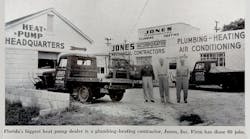As I was doing my homework in preparation for CONTRACTOR’s 70th Anniversary year I was struck by how much the plumbing industry—an industry as old as civilization—has been changed by advances in technology in the span of this publication’s history.
The digital revolution that brought computing power first to the desktop and then to mobile devices changed how everyone does business. For the plumbing industry those changes were first felt in the back office—accounting, inventory, scheduling & dispatch, system design—but now the smartphone is probably a technician’s most essential tool.
(Speaking of which, columnist Matt Michel has some valuable advice for evaluating field service management software. And if you're looking for new software, be sure to check out the latest version of our Software Showcase.)
The smartphone is like having the manual for every piece of equipment you could conceivably encounter right in your pocket, only better: the entire service history of a particular unit, everything a given customer has ever done with your company, all linked by a QR code label and stored on the cloud, right there for the technician to see.
And now Artificial Intelligence has arrived on the scene. Currently it is probably most widely being used to assist—in some cases replace—CSRs by gathering information and booking customer appointments. But soon it will be doing a lot more, particularly when it comes to troubleshooting systems.
But so much of the digital revolution is happening behind the scenes. There is a microchip and sensor in practically everything these days. For anyone who works in fleet management, that means a wealth of telematics data to improve performance, maintenance, scheduling and driver training.
More specifically for the plumbing industry, it has meant a revolution in controls. Where before plumbing systems relied mainly on gravity, pressure and mechanical settings, now circulators can optimize their flow rates to deliver the most efficient hydronic heating. Boilers and water heaters can be controlled remotely. Everything is connected, and more and more smart systems are talking to each other and only involving a human being when it is necessary.
But for all the advances in digital technology there has been so much more. In the late 1950s, most indoor water piping systems were comprised of galvanized steel. Plastic piping systems, such as ABS, PVC and CPVC were introduced in the 1960s, then PEX piping in the 1970s. Plastic piping is now an essential part of modern plumbing.
On the tools side, about the biggest thing to ever hit the plumbing business has been press tools. Yes, brazing is an essential plumbing skill that will always be needed, but when you see one worker with only a few hours training able to make a series of connections in a day that would normally take a four-person crew, it’s impossible not to see the technology as a game changer.
Water heating appliances have come as far from the cast-iron boilers of the 1950s as, well, a Tesla is from the first Ford Thunderbird or Buick Skylark. The first condensing boilers were developed in the Netherlands in the 1970s. While the first tankless water heaters were developed (by Stiebel-Eltron) in 1929, they didn’t make inroads in the North American market until the 1990s. While heat pumps have been around since the 1850s, it was Japanese-engineered inverter-driven compressors that really gave them a boost in the 1970s.
I could go on. Trenchless pipe repair. Video pipe inspection. Low-flow fixtures. The Water Demand Calculator. Everything has changed so much, and the pace of change shows no sign of slowing. Which means education and training have to be an essential part of every plumbing business.
Luckily, there are plenty of training resources to be had. Manufacturers, especially, want their products to perform as advertised. If you can’t travel to them, they will in many cases find ways to travel to you.


